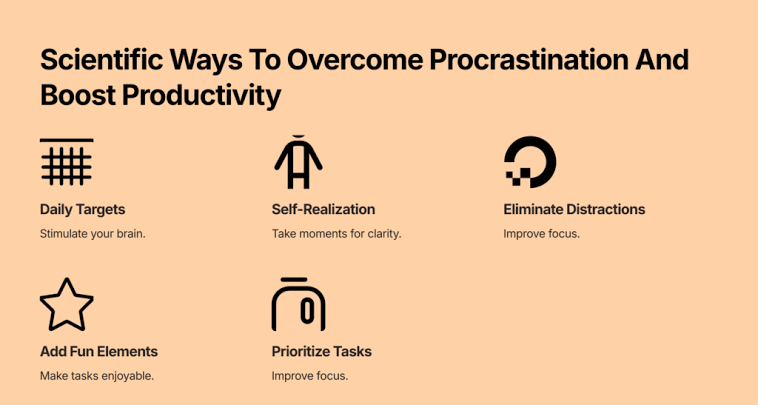Procrastination is a common challenge that affects productivity, mental clarity, and personal growth. It often begins with small delays that evolve into patterns of avoidance. The key to breaking this cycle lies in understanding its root causes and implementing practical, consistent strategies to stay focused. By developing discipline and applying daily habits that encourage action, individuals can improve time management, motivation, and overall efficiency in their personal and professional lives.
Understand the Root Cause of Your Procrastination
Before trying to fix procrastination, you must understand why it happens.
- Are you avoiding tasks due to fear of failure or perfectionism?
- Do you feel overwhelmed by the size of the task?
- Is there a lack of motivation, interest, or clarity?
Recognizing your personal triggers can help you choose the right solutions. For example, if fear is the cause, building confidence might be the remedy. If boredom is the issue, changing the environment may help.
Break Tasks Into Manageable Pieces
Large tasks often feel intimidating and can lead to avoidance. One powerful method is breaking them down into small, achievable steps.
- Start with micro-tasks that can be completed in 5–10 minutes.
- Focus on just one part of the project rather than the whole.
- Celebrate small wins to build momentum and confidence.
Completing bite-sized tasks makes progress feel tangible and motivates continued effort.
Use the Two-Minute Rule
This simple rule helps you act quickly and avoid delays.
- If a task takes two minutes or less, do it immediately.
- It creates a sense of accomplishment and clears mental clutter.
- For larger tasks, just commit to working for two minutes—you’ll often keep going.
The two-minute rule works because it lowers the resistance threshold and makes starting easier.
Create a Daily Routine With Clear Priorities
Routines reduce decision fatigue and create structure for focus.
- Start each day with a clear to-do list ranked by priority.
- Tackle the hardest or most important task first (known as “eating the frog”).
- Schedule breaks and work blocks to maintain energy.
When you begin the day with intention, you’re less likely to fall into procrastination traps.
Eliminate Distractions from Your Environment
Focus cannot thrive in a chaotic or distracting setting.
- Turn off unnecessary notifications on your phone and computer.
- Use website blockers to prevent access to distracting sites during work hours.
- Organize your workspace to reduce visual clutter.
Create a space that supports your goals, not one that pulls you away from them.
Set Deadlines and Use Time Blocking
Deadlines create urgency and structure, helping you beat the tendency to delay.
- Set realistic but firm deadlines for every task.
- Use time blocking to dedicate specific hours to specific work.
- Include buffer time for unexpected interruptions.
Sticking to a structured schedule encourages discipline and reduces the chance of pushing things off.
Use the Pomodoro Technique
The Pomodoro Technique is a proven time-management method that boosts focus.
- Work for 25 minutes, then take a 5-minute break.
- After four sessions, take a longer 15–30 minute break.
- Use a timer to stay consistent and track your productivity.
This method promotes sustained concentration and prevents burnout.
Build Accountability Systems
Having someone to report progress to increases responsibility and commitment.
- Partner with a friend or colleague and share goals weekly.
- Join an accountability group or use social platforms to share your progress.
- Use apps that track habits and tasks with reminders and reports.
External accountability can be the push you need to stay focused and follow through.
Focus on the Outcome, Not Just the Task
Visualizing the result of completing a task can provide motivation.
- Picture how finishing the task will improve your life or reduce stress.
- Write down the benefits of completion and revisit them when tempted to delay.
- Remind yourself of the long-term goals you’re working toward.
When the “why” becomes stronger, the resistance to act becomes weaker.
Practice Self-Compassion and Avoid Perfectionism
Perfectionism often fuels procrastination. The fear of not doing something perfectly can prevent you from starting at all.
- Accept that progress is better than perfection.
- Be kind to yourself when you slip—self-criticism only worsens avoidance.
- Focus on completing, then improving, rather than aiming for flawlessness from the start.
By allowing yourself room to grow and improve, you eliminate pressure and make action easier.
Use Motivation Triggers and Rewards
Motivation can be sparked by internal and external cues.
- Play a specific playlist to signal it’s time to work.
- Set a timer and race against yourself for fun.
- Reward yourself after completing a difficult task—snacks, walks, breaks, or screen time.
Training your brain to associate productivity with reward builds positive reinforcement and helps make consistent focus a habit.
Evaluate and Reflect Regularly
Reflection is essential for improvement. Take time weekly to assess what worked and what didn’t.
- Track how often you procrastinate and why.
- Adjust your strategies based on patterns you notice.
- Ask yourself: Did I meet my goals? What barriers can I remove?
Regular evaluation helps you stay aware and proactive in improving focus.
Conclusion: Master Focus by Taking Consistent Action
Overcoming procrastination doesn’t happen overnight. It requires a blend of self-awareness, practical tools, and consistent habits. By identifying your triggers, structuring your day, limiting distractions, and staying motivated through rewards and accountability, you can retrain your mind to act decisively and productively. With patience and persistence, focus becomes second nature, and procrastination becomes a habit of the past.



